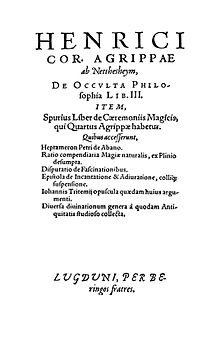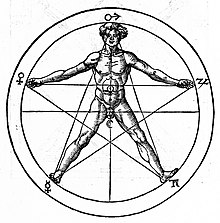Three Books of Occult Philosophy


Three Books of Occult Philosophy (De Occulta Philosophia libri III) is Heinrich Cornelius Agrippa's study of occult philosophy, acknowledged as a significant contribution to the Renaissance philosophical discussion concerning the powers of magic, and its relationship with religion. The first book was printed in 1531 in Paris, Cologne, and Antwerp, while the full three volumes first appeared in Cologne in 1533.[1]
The three books deal with elemental, celestial and intellectual magic. The books outline the four elements, astrology, Kabbalah, numerology, angels, names of God, the virtues and relationships with each other as well as methods of utilizing these relationships and laws in medicine, scrying, alchemy, ceremonial magic, origins of what are from the Hebrew, Greek and Chaldean context.
These arguments were common amongst other hermetic philosophers at the time and before. In fact, Agrippa's interpretation of magic is similar to the authors Marsilio Ficino, Pico della Mirandola and Johann Reuchlin's synthesis of magic and religion, and emphasize an exploration of nature.
History
[edit]The first draft of the Three Books was presented by Agrippa in 1510 to Abbot Johannes Trithemius. The text survives to this day and draws heavily from Ficino, Pliny the Elder and Pico Della Mirandola, among other works well-known to scholars of the Renaissance.[2]
In 1526-27, Agrippa published a satirical-critical work called De Incertitudine Et Vanitate Scientiarum Liber, in which he seemingly retracted his Three Books, apparently admitting that his occult studies were misguided. However, whether Agrippa was genuine remains a matter of scholarly debate.[2]
The final and complete edition of the Three Books was published in Cologne in 1533. A first English translation was published in 1651.[3]
Editions
[edit]- Agrippa, Henry Cornelius (1651). Three Books of Occult Philosophy. Translated by James Freake. London: Printed by R.W. for Gregory Moule.
- ——— (1898). Whitehead, Willis F. (ed.). Three Books of Occult Philosophy: Book One – Natural Magic. Chicago: Hahn & Whitehead.
- ——— (1913). de Laurence, L. W. (ed.). The Philosophy of Natural Magic. Translated by James Freake. (Book One only)
- ——— (1974). Shepherd, Leslie (ed.). The Philosophy of Natural Magic. Translated by James Freake. University Books. ISBN 0-82160-218-7. (Book One only; reprint of the Laurence edition)
- ——— (1986). Three Books of Occult Philosophy. Translated by J. F. (Facsimile ed.). Hastings, England: Chthonios Books.
- ——— (2005). Tyson, Donald (ed.). Three Books of Occult Philosophy. Translated by James Freake. Llewelyn Worldwide. ISBN 0-87542-832-0.
- ——— (2020). De Occvlta Philosophia. Vol. I–IV. Translated by Paul Summers Young. Black Letter Press.
- ——— (2021). Three Books of Occult Philosophy. Translated by Eric Purdue. Inner Traditions. ISBN 978-1644114162.
See also
[edit]References
[edit]- ^ Van Der Poel, Marc (1997). Cornelius Agrippa: The Humanist Theologian and His Declamations. Brill. p. 44.
- ^ a b Agrippa, Heinrich Cornelius (2021). Three Books of Occult Philosophy. Translated by Purdue, Eric. Inner Traditions. pp. xxxiv. ISBN 9781644114162.
- ^ Agrippa, Heinrich Cornelius (2021). Three Books of Occult Philosophy. Translated by Purdue, Eric. Inner Traditions. pp. xxxv.
External links
[edit]- Three Books of Occult Philosophy (London, 1651) – From the Michigan State University digital collections. PDF.
- De occulta philosophia – From the Collections at the Library of Congress
- De occulta philosophia. Book 4 – From the Collections at the Library of Congress
- Book One - Natural Magic (Chicago: Hahn & Whitehead, 1898) - From the Cornell collection at the Internet Archive
- Selected images from De occulta philosophia From The College of Physicians of Philadelphia Digital Library
- The Philosophy of Natural Magic (Chicago: de Laurence, 1913) – From Internet Sacred Text Archive


 French
French Deutsch
Deutsch